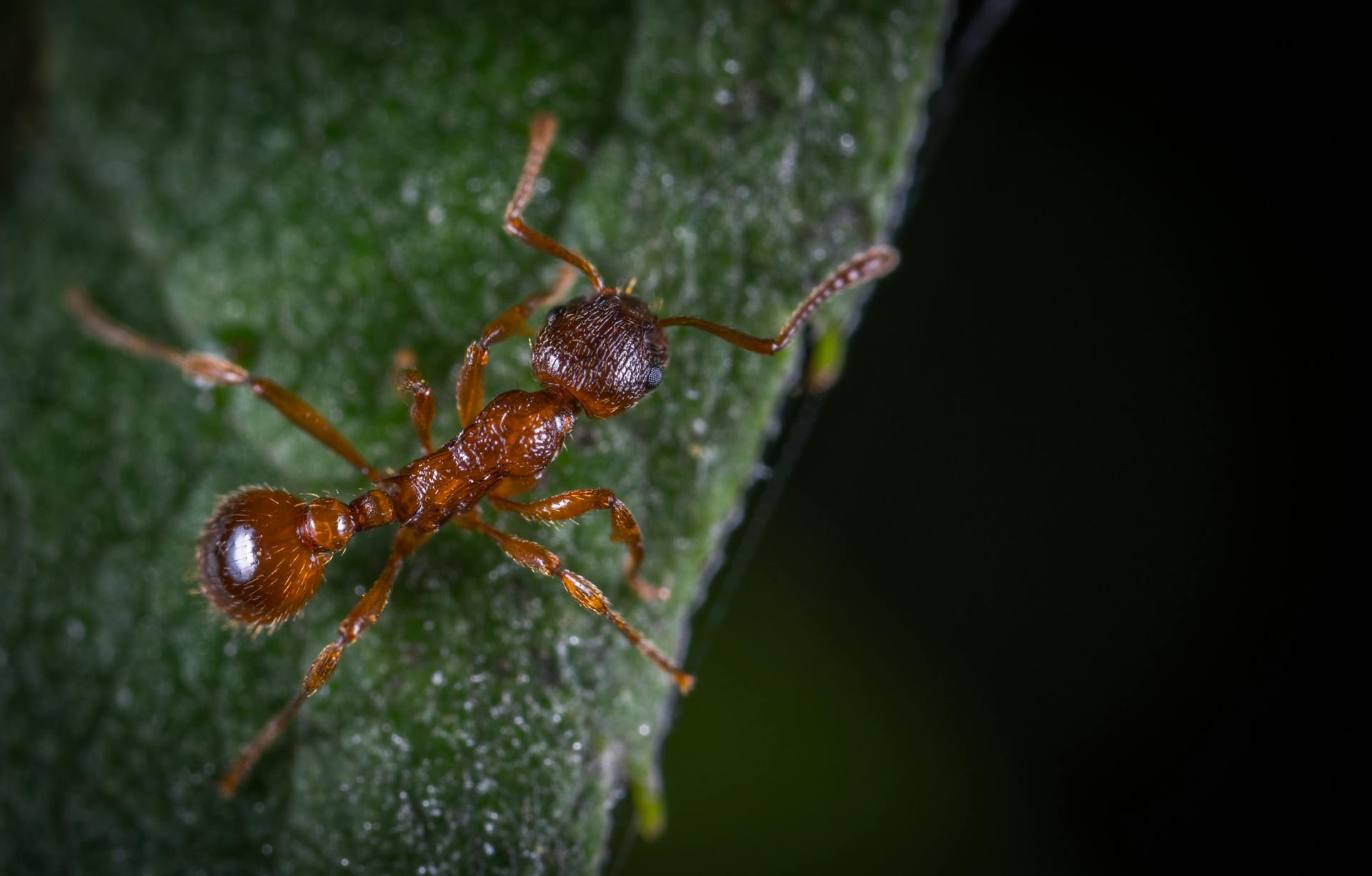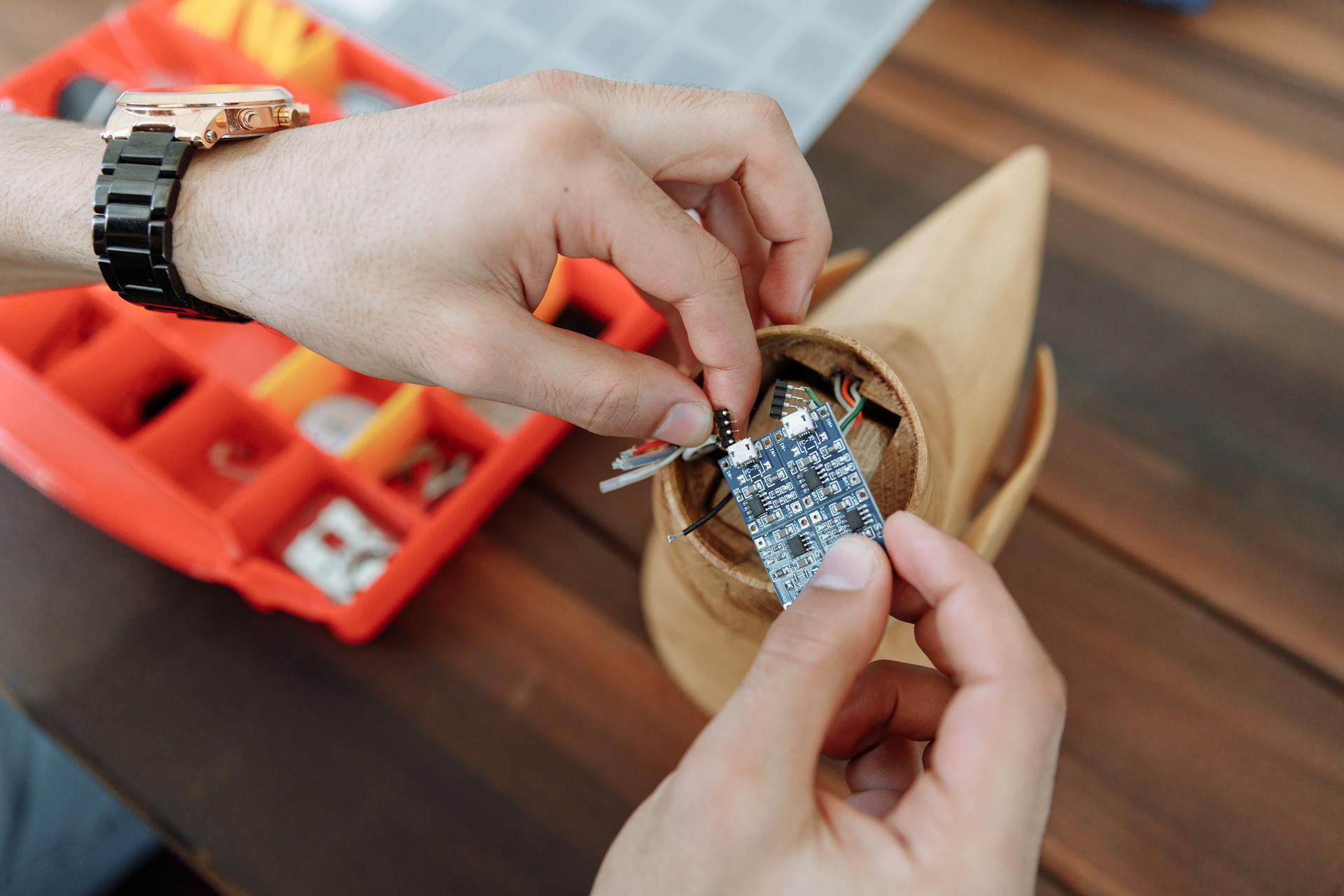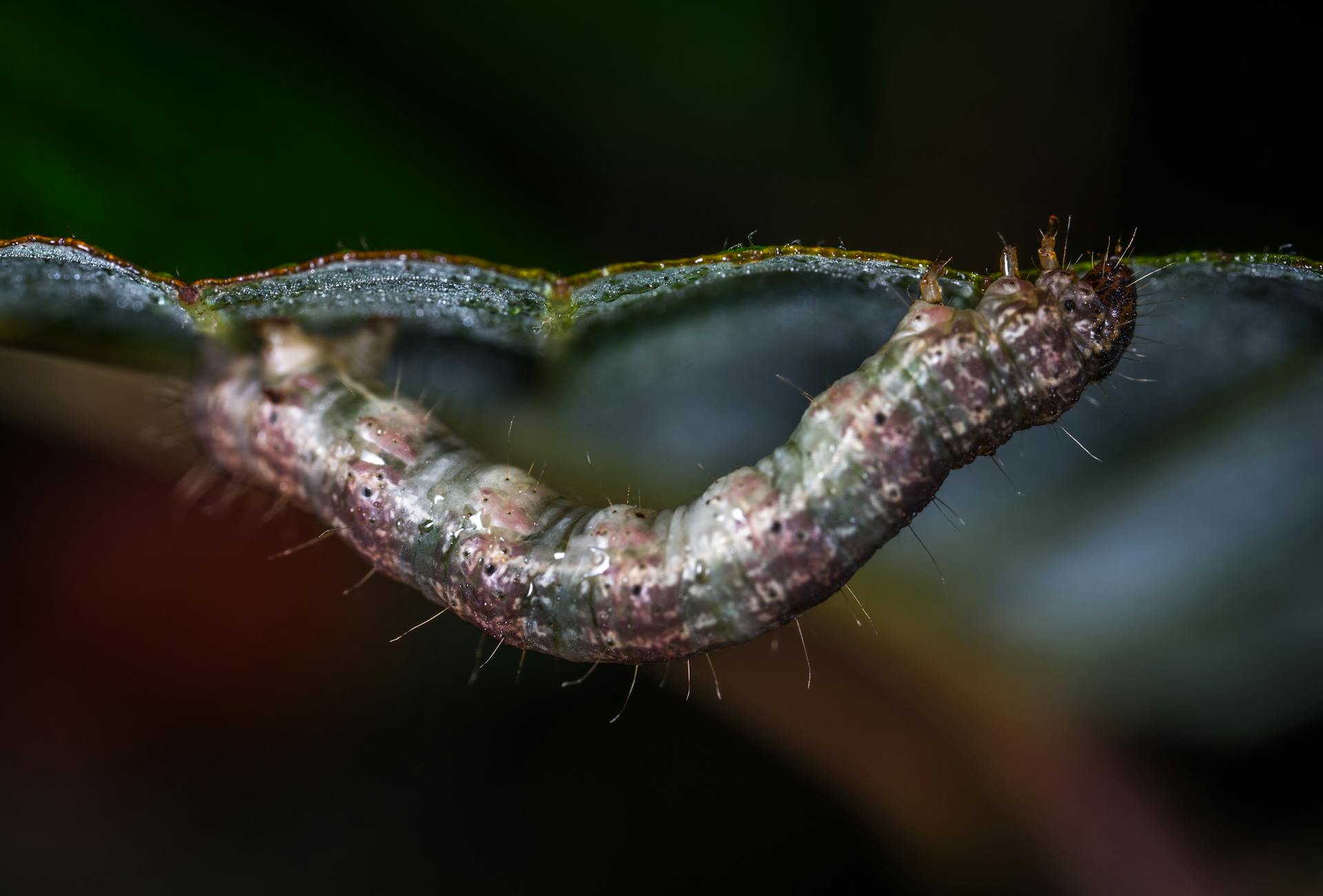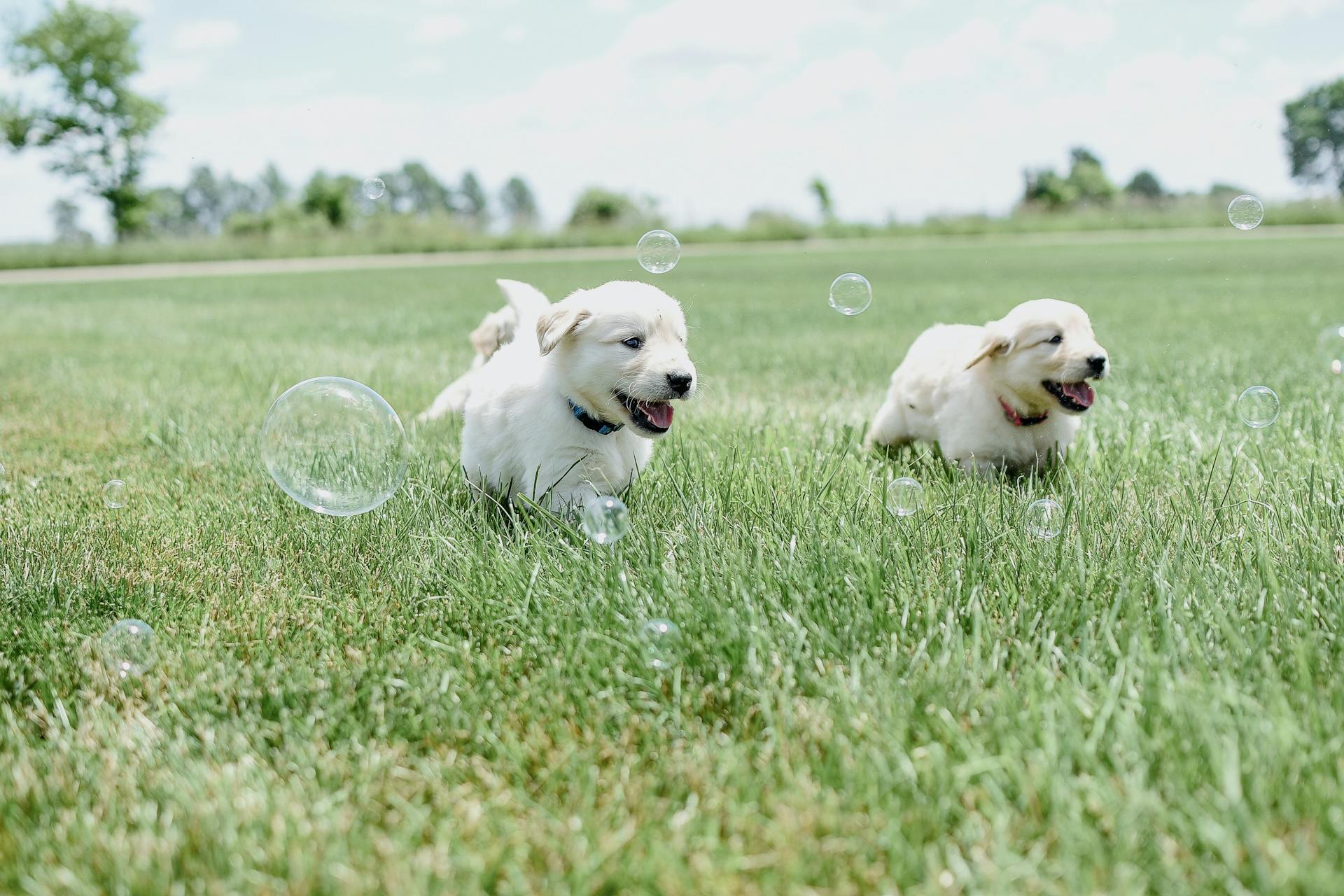
The Micro Aussiedoodle Breed is a cross between an Australian Shepherd and a Miniature Poodle, typically weighing between 10-20 pounds. This small size makes them a great fit for city living or families with smaller spaces.
Their intelligence is unmatched, with a high trainability level that's on par with their larger counterparts. They thrive on mental stimulation and require regular exercise to prevent boredom and destructive behavior.
Their coats are low-shedding, requiring regular grooming to prevent matting and tangling. This makes them a great choice for those with allergies or who prefer less dog hair.
Their friendly and outgoing personalities make them a joy to be around, always eager to please and play.
Temperament and Behavior
The micro Aussiedoodle is a loving and social breed that thrives on interaction with its family. They become very attached to their owners and make excellent family dogs.
Their playful and active nature requires daily walks and play sessions to keep them healthy. With proper training and socialization, they are great with children of all ages and make fast friends with other pets and strangers.
Miniature Aussiedoodles are highly intelligent, loyal, and outgoing, making them a joy to be around. Their clever and curious nature makes them eager to please and fun to train.
Here are some key traits to expect from your micro Aussiedoodle:
- Highly intelligent and easy to train
- Clever and curious, loving mental stimulation
- Active and playful, requiring daily exercise
- Loyal and gentle, making great family dogs
- Great with children, other pets, and strangers
Their adventurous spirit and love for games, canine sports, and outdoor activities make them excellent hiking companions. They're also comfortable in both hot and cold climates due to their thick, rich coat.
Overall, the micro Aussiedoodle is a loving, social, and intelligent breed that makes a great companion for active families.
Family and Pet Compatibility
The Mini Aussiedoodle is a great choice for families with children, as they are generally great with kids and don't exhibit aggressive tendencies when properly trained.
They'll need a lot of playtime and exercise, which makes them a perfect fit for active families who can devote time to play and exercise.
Socializing your Miniature Aussiedoodle with other animals starting during puppyhood is crucial to ensure they get along well with others.
Their Australian Shepherd genetics may make them prone to herding tendencies, but this can easily be avoided with proper training.
Introducing your Mini Aussiedoodle to other pets properly is key to a harmonious household.
Proper training and socialization can prevent unwanted behaviors like herding or chasing, making your Mini Aussiedoodle a well-behaved and well-rounded companion.
Recommended read: Aussiedoodle Training
Owning a Mini
They require regular daily exercise to keep them happy and healthy.
Mini Aussiedoodles pack a lot of energy and love into their small frame, so they need to be kept active.
Behavioral problems can surface in any dog without enough mental or physical stimulation.
They can become very dependent on your presence and anxious when left alone, so proper training from a young age is vital to avoid this behavior.
Their high-maintenance coat requires regular grooming, thanks to their Poodle genetics.
Grooming and Health
Grooming a Micro Aussiedoodle is relatively low-maintenance, but regular brushing is essential to prevent matting and keep their coat healthy. Brushing their coat every other day will help keep their hair smooth and tangle-free.
Their nails need to be trimmed regularly to prevent overgrowth, which can cause pain and infection. It's also essential to check their ears regularly and clean any dirt or debris that builds up. Mini Aussiedoodles are prone to dental issues, so brushing their teeth regularly is crucial.
Here are some essential grooming tasks to keep in mind:
- Brush their coat every other day
- Trim their nails regularly
- Check and clean their ears regularly
- Brush their teeth regularly
As for their health, Micro Aussiedoodles are generally a healthy breed with a lifespan of between 10 and 15 years. However, they can be prone to certain health conditions, such as Sebaceous Adenitis, Cataracts, and Progressive Retinal Atrophy. Regular vet checks are essential to catch any potential issues early on.
Take a look at this: Mini Aussiedoodle Health Issues
Grooming
Grooming is a crucial aspect of Mini Aussiedoodle care, and it's essential to brush their coat regularly to prevent matting. Brushing their coat every other day can help keep their hair smooth and tangle-free.
The Mini Aussiedoodle's coat is high-maintenance, requiring frequent brushing and regular grooming to keep it healthy. This means you'll need to brush their coat every other day to prevent matting.
Regular nail clipping is also vital to prevent overgrowth, which can cause damage to the nail bed and lead to pain, inflammation, and infection. If your Mini Aussiedoodle is energetic, they might file their nails down on their own, but it's still essential to clip them when they start to make clicking noises as they step.
Cleaning their ears regularly is crucial to prevent bad odor or rashes. You should clean the outer part of their ear with a damp cloth every week or so, and pluck any excess hair that stands out from the ear canal.
Like all dogs, Mini Aussiedoodles are prone to dental issues, so it's essential to brush their teeth regularly. Brushing their teeth daily, if possible, and providing them with plenty of chew toys and dental sticks can help prevent dental problems.
Health
Mini Aussiedoodles are generally healthy dogs with a lifespan of between 10 and 15 years. Proper care and nutrition are essential for their longevity.
They have a lower risk of health conditions due to their genetic diversity. However, they can still be prone to health issues passed down from their parent breeds.
Sebaceous Adenitis, Cataracts, and Progressive Retinal Atrophy are potential health concerns for Mini Aussiedoodles. These conditions can appear at any time during a dog's life, especially as they age.
Hip Dysplasia, Cushing's Disease, Pancreatitis, Epilepsy, and Multiple Drug Sensitivity are also potential health issues that can affect Mini Aussiedoodles. Regular vet checks are crucial to catch any possible conditions early on and treat them accordingly.
Some health conditions common in Poodles and Mini Australian Shepherds, such as allergies, cataracts, and eye issues, are rare among Mini Aussiedoodles.
Mini Can Have Two Colored Eyes
Mini Aussiedoodles can have two different colored eyes, a condition called heterochromia that's more common in this breed than many others. This unique feature can result in a combination of brown, blue, hazel, amber, or green eyes, and in some cases, even multiple colors in the same eye.
The genetics of the Australian Shepherd, one of the parent breeds, can pass along this trait to the Mini Aussiedoodle. This means that if you have a Mini Aussiedoodle with heterochromia, it's likely due to the influence of the Australian Shepherd's genetics.
Mini Aussiedoodles with heterochromia can have eyes that are striking and beautiful, but it's essential to remember that this condition can also be a sign of other health issues. Regular eye check-ups with a veterinarian can help monitor the health of your Mini Aussiedoodle's eyes.
Discover more: Aussiedoodle vs Australian Shepherd
Interesting Facts and Traits
The Micro Aussiedoodle is a delightful breed, and here are some interesting facts and traits that make them even more lovable.
They are a cross between an Australian Shepherd and a Miniature Poodle, which is why they're often referred to as a "designer dog".
This mix of breeds gives them an intelligence level that's off the charts, often ranking among the top three smartest dog breeds.
A different take: Wolfdog Breeds
Their high energy levels are a result of their Australian Shepherd heritage, which means they need plenty of exercise to stay happy and healthy.
They are also known for their affectionate nature, making them a great companion for families or individuals who want a loyal friend.
Their low-shedding coat is a bonus for those with allergies or who prefer less dog hair in their lives.
Their size is another advantage, as they're small enough to live in apartments but still love to run and play.
Training and Influence
Mini Aussiedoodles are highly intelligent and easy to train, making them a joy to work with. They are eager learners and pick up on tricks quickly, with a strong desire to please their owners.
Positive reinforcement is a great approach to training, as these dogs thrive on praise, encouragement, and treats. You can start training your puppy as early as 8 weeks, teaching them basic commands like sit, come, and wait.
Leash training and socializing are also a breeze, as these dogs love to make friends and interact with everyone in their path. They are social, friendly, and well-mannered, making them a great addition to any family.
Training

Training your Mini Aussiedoodle puppy is a breeze, especially since they're highly intelligent and eager learners. They pick up on tricks quickly and love to be mentally stimulated.
You can start training as early as 8 weeks, teaching basic dog commands like sit, come, and wait. Positive reinforcement and reward-based training methods work well with these puppies.
Mini Aussiedoodles are social, friendly, and well-mannered, making leash training and socializing a piece of cake. They love to make friends and explore their surroundings.
To socialize your puppy, start with low-distraction areas where they're comfortable during the day. Introduce them to family members or other pets in the house in a gentle manner.
At 12 weeks, your puppy is ready to learn more advanced lessons. With patience and positive reinforcement, you'll have a well-behaved and intelligent Mini Aussiedoodle in no time.
For your interest: Puppy Wolfdog
Australian Shepherd Influence
Australian Shepherds are tough, energetic, and smart dogs with a strong need to have something to do.
They excel in agility training and obedience trials, making them wonderful running companions and experts at playing Frisbee and flyball.
The instinct to herd is strong, and Aussies have been known to herd children, ducks, and sheep.
Australian Shepherds can be prone to certain genetic conditions, making health testing crucial for those used in breeding.
The breed standard calls for heights between 18 and 23 inches, with weights between 25 and 70 pounds being acceptable.
Males are quite a bit larger than females, and some Australian Shepherds are born with bobbed tails and blue eyes or eyes of different colors.
Acceptable coat colors are blue and red merles, black, or red, with considerable white markings allowed.
Related reading: Aussiedoodle Colors
Poodle Coat Influence
The Poodle coat influence is a significant factor in the Aussiedoodle's overall appearance and characteristics.
The Poodle is an old breed that has been bred into three size ranges: Standard, Miniature, and Toy.
Poodles are known for their intelligence and trainability, which made them popular hunting dogs in France and Germany.

Their coat color, texture, shedding, and tolerance to weather variations are all influenced by their Poodle lineage.
The Poodle's unique coat traps naturally shed dander, making them nearly hypoallergenic.
They are generally solid-colored dogs, but some individuals can be multicolored.
Their naturally curly coat is the primary reason Aussiedoodles and other Doodle crosses were developed.
Care
Micro Aussiedoodles are generally healthy dogs with a lifespan of between 10 and 15 years. Proper care and nutrition are essential for their longevity.
Regular vet checks are crucial to catch any possible conditions early on. This can help ensure that any health issues are treated promptly.
One of the benefits of Micro Aussiedoodles is their genetic diversity, which reduces the risk of certain health conditions. However, they can still be prone to health issues, especially as they age.
Some health conditions that Micro Aussiedoodles may be prone to include Sebaceous Adenitis, Cataracts, and Progressive Retinal Atrophy. These conditions can be inherited from their parent breeds.
Here are some other potential health issues to be aware of:
- Hip Dysplasia
- Cushing’s Disease
- Pancreatitis
- Epilepsy
- Multiple Drug Sensitivity
To keep your Micro Aussiedoodle healthy, it's essential to provide regular exercise and a balanced diet. Regular grooming is also important to prevent skin issues.
Frequently Asked Questions
Do mini aussiedoodles bark a lot?
Mini Aussiedoodles tend to bark moderately, often due to alertness, excitement, or anxiety, but not excessively like some smaller breeds. Their barking habits can be a consideration for potential owners.
How big does a micro mini Aussiedoodle get?
A micro mini Aussiedoodle typically reaches a height of 12 to 19 inches and weighs between 15 to 35 or 40 pounds. Regular grooming and socialization are crucial for their overall development and well-being.
Do mini aussiedoodles stay small?
Yes, Mini Aussiedoodles typically stay small in size, growing to 12-18 inches tall and weighing 15-25 pounds. Their compact size makes them a great choice for families with smaller living spaces.
Does a mini Aussiedoodle shed?
Mini Aussiedoodles tend to shed minimally due to their inherited low-shedding coat from their Poodle parent. Regular grooming is still necessary to maintain their soft and manageable coat.
What are the different types of mini Aussiedoodles?
The Mini Aussiedoodle comes in a variety of colors, including cream, black and white, and tri-colored variations, due to mixed genetics. These colors can range from solid to multi-tonal, offering a unique look for each dog.
Featured Images: pexels.com


